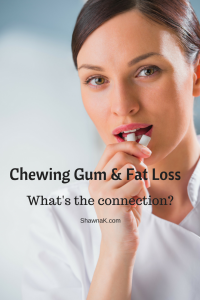Are you a gum chewer? 🍬
Does chewing gum interfere with your fat loss goals? Say what?
Here are some interesting facts for you courtesy of Dr. Mercola:
1. Chewing Gum May Increase Your Junk-Food Intake
Many people chew gum to reduce food cravings and, potentially avoid eating unhealthy foods. However, while research shows that chewing gum reduces your motivation to eat, your hunger and how much you end up eating, gum chewers’ meals end up being less nutritious than those eaten by non-gum-chewers.
For instance, people who chewed gum were less likely to eat fruit and instead were more motivated to eat junk food like potato chips and candy. This is likely because the minty flavor in the gum makes fruits and vegetables taste bitter.
2. It May Trigger TMJ (Temporomandibular Joint Disorder) in Your Jaw
Chewing gum can cause jaw muscle imbalance (if you chew on one side more than the other) and even TMJ or temporomandibular joint disorder in your jaw, which can be a painful chronic condition.
Anytime you overuse a certain set of muscles, it can lead to contracted muscles and related pain, including headaches, earaches, and toothaches over time.
3. Gastrointestinal Problems
Chewing gum causes you to swallow excess air, which can contribute to abdominal pain and bloating seen with irritable bowel syndrome (IBS).
When you chew gum you send your body physical signals that food is about to enter your body. The enzymes and acids that are activated when you chew gum are therefore released, but without the food they’re intended to digest.
This can cause bloating, an overproduction of stomach acid, and can compromise your ability to produce sufficient digestive secretions when you actually do eat food.
Some people may also have adverse gastrointestinal symptoms, including diarrhea, from the artificial sweeteners that are commonly found in chewing gum.
4. Tooth Damage – Even from Sugar-Free Gum
If your chewing gum contains sugar, you’re essentially “bathing” your teeth in sugar when chewing which contributes to tooth decay.
Even if you chew sugar-free gum, there are still risks to your teeth because sugar-free gum often contains acidic flavorings and preservatives that may in fact lead to dental erosion.
Unlike cavities, dental erosion is a process of incremental decalcification, which, over time, literally dissolves your teeth.
5. Sheep Byproducts
Chewing gum often contains lanolin, a waxy substance that’s derived from sheep wool, to help it stay soft. While not necessarily dangerous to your health, chewing on lanolin is not exactly appetizing. Ewww!
6. Release Mercury From Your Fillings
If you have mercury fillings, chewing gum may cause this known neurotoxin to release from the fillings into your body. According to one study:
“…chewing gum has been shown to increase the release rate of mercury vapor from dental amalgam fillings… The impact of excessive chewing on mercury levels was considerable.”
Every time you chew, mercury vapor is released and quickly finds its way into your bloodstream, where it causes oxidative processes in your tissues. If you chew gum, you’re going to be chewing often, which is why it’s particularly problematic for those with mercury fillings.
I bring this up because a nutrition coaching client wanted to know if chewing gum was counter productive to her goals.
Together we determined the best course of action given her health circumstances.
Imagine having a sounding board to bounce ideas off (even ones like this that may seem benign to health goals) and finding out without having to do a lot of research on your own.
Yup, that’s what we do…
Let me know if you’d like some nutritional support. Fill in this questionnaire and let’s start the conversation!




